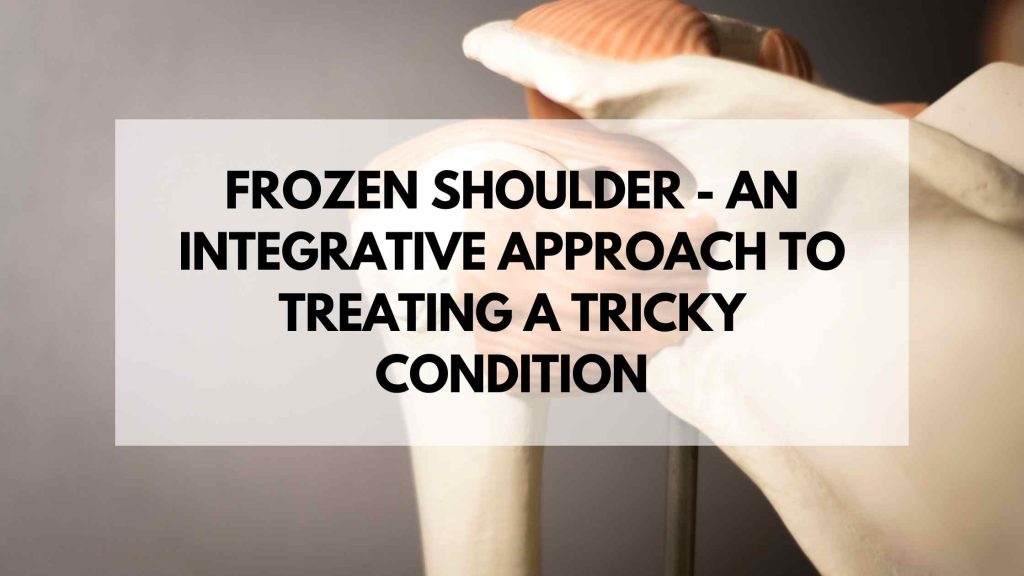Frozen shoulder, also known as adhesive capsulitis, is a condition that affects millions of people worldwide. It is characterized by severe pain and stiffness in the shoulder joint, which can make even simple tasks such as dressing or brushing your hair difficult to do. Studies have shown that frozen shoulder occurs in up to between 5- 20% of individuals over the age of 40 and is more common among women than men.
Treatment for frozen shoulder typically involves physical therapy, medications, steroid injections, and sometimes even surgery. Frozen shoulder can often be tricky and difficult to treat and in my opinion these situations are often misdiagnosed as a frozen shoulder when the underlying problem is something entirely different.
However, there are now integrative approaches available that combine evidence-based treatments with holistic therapies such as neurofunctional acupuncture, dry needling, and regenerative medicine for improved outcomes.
What is frozen shoulder?
Frozen shoulder is a condition that causes pain and stiffness in the shoulder joint. It occurs when the joint capsule (the structure around the shoulder) becomes inflamed, thickens, and adheres to the surrounding bones, limiting movement and causing pain. Symptoms of frozen shoulder can include:
Integrative approaches are often used to treat frozen shoulder because the standard of care treatments we will talk about below don’t offer great outcomes. The good news is that these integrative approaches do in fact help the pain and limited range of motion that occur with frozen shoulder.
Symptoms of frozen shoulder
• Pain at rest or with movement
• Limited range of motion
• Stiffness or tightness in the shoulder joint
• Weakness when moving the affected arm
• Aching or burning sensations
The 3 Stages of Frozen Shoulder
- Freezing stage. Pain occurs when you move your shoulder, and the range of motion of your shoulder begins to be restricted.
- Frozen stage. The pain begins to lessen at this point. While your shoulder gets stiffer, using it becomes more difficult.
- Thawing stage. Your shoulder’s range of motion begins to improve.
Standard of care treatments
- High dose steroids for frozen shoulder
High dose steroids for frozen shoulder are the most commonly used standard of care treatments. The use of steroid injections can significantly reduce pain and improve range of motion in frozen shoulder more quickly than physical therapy, rest, or medications alone. Steroids are toxic to cartilage and we’ve known this since the 1950’s but for some reason they have become the first line of treatment. When we look at the studies where steroids are compared to normal saline solution, the outcomes are surprisingly similar. Except for the fact that steroids are toxic and can lead to further arthritis and degeneration. Multiple rounds of steroid injections would not be my first choice and in-fact I see them as a huge disservice to you.
- Manipulation under anesthesia
Manipulation under anesthesia (MUA) is a procedure that is performed in a hospital o surgery center setting. It is performed when conservative therapies have failed. Basically you are put to sleep and a surgeon forcefully moves the shoulder in various directions in an effort to stretch or tear the scar tissue. Risks include fracture of the arm bone, dislocation of the shoulder, tears in the rotator cuff and labrum, blood clots, and nerve damage Manipulation under anesthesia is typically combined with an intra-articular steroid injection.
- Surgery
According to the Annals of the Royal College of Surgery, “Both conservative and surgical treatment may result in equal outcome two to three years from the onset.” PMID: 21943454
Surgery has it’s own risks – anesthesia, the occurrence of scar tissue, re-occurance of frozen shoulder, months of pain, months of physical therapy and the chance that surgery doesn’t even help.
In my opinion, surgery is generally not a good option for frozen shoulder.
What is the best frozen shoulder treatment?
All frozen shoulder problems should begin with conservative care – including physical therapy, metabolic management, and neurofunctional acupuncture. Let’s dive into what I see in my clinic in Tampa, FL and the strategies I have used over the last 10 years to help patients with frozen shoulder.
When it comes to any pain condition – I take a completely different approach. Instead of looking to just name a problem and blame it on a single structure, my goal is to understand what is happening from a functional perspective.
In cases of frozen shoulder we have severe limitations in range of motion and pain that are simultaneously happening.
So let’s understand this more and then I will lay out my most common treatment options I use to treat frozen shoulder in Tampa,FL.
First we have irritation and inflammation of the joint capsule.
Then we have functional limitations in range of motion in all 4 major rotator cuff muscles.
Then we have functional changes in all of the ligaments that stabilize the shoulder.
And we also have irritation in the nerves that innervate the shoulder and the shoulder joint.
So to be comprehensive we have to treat all 3 different areas as they present themselves.
- Neurofunctional Acupuncture
- We can use this very specialzied technique that Dr. Hanson both practices and teaches to restore function to irritated and sensitized nerves. (Your normal dry needling practitioner doesn’t have a clue how to do this.)
- Dry Needling
- We can use this technique to address trigger points in the rotator cuff muscles.
- Capsule distention
- We can use this injection therapy to create space in the tightened down and inflamed joint capsule.
- 5% Dextrose Therapy
- We can use this technique to calm inflammation down in both the joint capsule and also the nerves and ligaments that surround the joint.
- Ozone Therapy
- We can use this technique to calm down the inflammatory process, distend the joint capsule and help improve the healing process.
In Conclusion
Frozen shoulder can be a tricky and stubborn problem to experience and the standard of care treatments often have poor outcomes as I’ve outlined above.
The good news is that the comprehensive integrative approach Dr. Josh Hanson, DACM takes in Tampa, FL can and often does produce wonderful outcomes in both reducing your frozen shoulder pain and also restoring range of motion.
If you are experiencing the symptoms of frozen shoulder then don’t hesitate to reach out and seek treatments that might not be covered by your insurance company and that can help speed up your healing process by potentially years.


